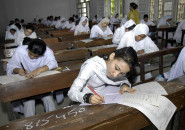Controversy: Teachers’ body barred from holding elections
Development coincides with Oct 6 notification of separating govt colleges and schools depts

Controversy: Teachers’ body barred from holding elections
The development coincided with the October 6 notification of separating the government colleges and schools departments. However, the restraining order is unlikely to be related to this division as the SPLA is not principally opposed to the concept.
“... your act to collect membership and other fees and conducting elections is illegal and supposed to be contempt of court till the decision of [the Sindh High] court case and approval of amended articles of your association,” reads an October 5 letter addressed to SPLA’s general secretary, Prof Sher Khan Seelro, warning legal action for non-compliance.
It was written by assistant registrar of Joint Stock Company (JSC), which functions under Sindh Industries and Commerce department and registers all the societies, associations, foundations and organisations under Societies Registration Act, 1860. This action was taken on the complaint of Yaqoob Chandio, whose group of teachers split from the SPLA’s body, which emerged after the disputed 2012 elections.
For years, the SPLA has been clamouring for adoption of a mechanism in Sindh that allows timely promotions of teachers in the upper grades. Their secondary demands cover a range of issues from benefits for teachers to infrastructure and facilities for colleges.
The association also keeps reiterating its warnings of resistance to the government’s anticipated plans of privatising the public-sector educational institutions. Despite the split, both the groups have clung on to the same demands.
Elections
On August 21, the SPLA announced elections of its central committee on November 15. The process of electing the bodies at college-level units was slated to be completed by September 30 followed by the elections of all district-based bodies as well as Karachi, Hyderabad and Sukkur regions in Sindh on October 27.

The SPLA’s spokesperson, Anwar Saagar Kandhro, says that among the 250 government colleges in Sindh, a majority have so far conducted the elections while 90% of 76 colleges in Hyderabad region held the polls.
“[Despite the notice] we will go ahead with [the] election process,” he told The Express Tribune, adding that the decision was taken after consultation with their lawyer.
In reaction to the JSC’s notice, SPLA general secretary Prof Seelro called a meeting in Hyderabad on October 6. The meeting decided to file a contempt of court case against the assistant registrar of JSC as well as against Prof Yaqoob Chandio, the complainant.
Bank accounts and corruption charges
The SPLA collects Rs500 annual membership fee from each of its slightly less than 10,000 government college teachers in Sindh. However, after the controversy in 2012 elections, the official account number 1747-4 of the SPLA National Bank of Pakistan’s Market branch in Hyderabad was frozen. “For [the] last four years, they [SPLA’s disputed body] has been illegally collecting this fee from the members,” argued Chandio, a former vice-president SPLA, Sindh.
SPLA, Hyderabad, president Shahjahan Panhwar and finance secretary Muhammad Ali Shaikh opened a bank account in a private bank in Qasimabad for depositing the membership fee. While Chandio alleges that the association has unlawfully collected millions of rupees, the account holders claimed in a press statement that only Rs300,000 have been deposited.
“I have taken up this corruption scam with the [National Accountability Bureau] NAB and Anti-Corruption [Establishment],” said Chandio.
Background
Both the groups engaged in the SPLA’s turf war accuse each other of faking the elections in 2012. In March, 2014, the industries and commerce department initiated an inquiry in the disputed SPLA elections.
One group was led by Asif Zaidi and Tariq Mansoor as president and general secretary and other by Syed Ali Murtaza and Muhammad Siddiq Unar, respectively. However, after the JSC turned down the application of the Zaidi group for endorsement as SPLA’s office-bearers in January, 2013, they stopped operating as a group. Meanwhile, the other group has continued to operate as elected representatives of SPLA.
“There is a clear cut dispute between both the bodies/groups because Muhammad Siddique Unar Group [which is currently representing the invalidated SPLA] made fifth amendment after a single meeting of constitutional amendment committee ... and without proper intimation to its members ... and [used/acted] on such illegal/unapproved amendments for the tenure 2012-14 without approval of the Registration Authority [JSC],” read the findings of the report submitted on May 6, 2014.
“... it cannot be said the management [of 2012 body] is running in accordance with the requirement as per the Societies Registration Act, 1860, and the Memorandum of Articles,” suggested inquiry officer Manzoor Alam Farooqi in the report. “Therefore, I would propose that an administrator may be appointed to administer the affairs of [SPLA], [who] will also hold fair, free and impartial elections.”
However, the JSC’s assistant registrar, Jehangir Memon, confirmed while talking to The Express Tribune that the department has yet to implement the report’s recommendation of appointment of an administrator and conducting elections anew.
Chandio has also challenged the department’s inaction over the report in the Sindh High Court as the proceedings continue.
Published in The Express Tribune, October 11th, 2016.



















COMMENTS
Comments are moderated and generally will be posted if they are on-topic and not abusive.
For more information, please see our Comments FAQ